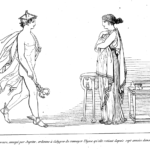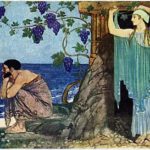STORY 0:00 – 54:30
The episode opens in year seven of Odysseus’ long, largely undocumented sojourn on Calypso’s island. Odysseus is longing for home, apparently unmoved by the promise of immortality with a goddess. Up on Mount Olympus: Athena pleads Odysseus’ case, Zeus relents, and Hermes is sent to Calypso’s island with orders that “Odysseus must be set free”. And as the episode concludes, Odysseus the master wordsmith engages in careful rhetorical diplomacy, tactfully soothing the wounded pride (and the jealousy) of a most-unhappy goddess.
POST-STORY COMMENTARY: ATHENA’S “PRACTICAL WISDOM”, and THE MYSTERY OF THE SEVEN MISSING CALYPSO YEARS 54:30 – 1:33:49
First, I provide a primer on Athena, the goddess of “metis wisdom”. I tell her origin story, and explain how Athena – a cunning, crafty, situational pragmatist – is truly her mother’s daughter. Next, I discuss Athena’s special relationship with Odysseus: a relationship which will dominate the remaining episodes of our story. Finally, I clarify how Athena’s “metis wisdom” differs profoundly from the “moral wisdom” of our favorite contemporary magical beings: Gandalf, Obi-Wan Kenobi, and Dumbledore.
In the second part of the Post-Story Commentary I raise the question of why both Odysseus (our usually effusive storyteller) and Homer (our omniscient narrator) are so annoyingly silent about the “seven Calypso years”? I posit the hypothesis that the “seven Calypso years” were a necessary “time delay device”, inserted into The Odyssey as a somewhat clumsy means of delaying Odysseus’ homecoming, until his son Telemachus had come of age.
RELATED IMAGES
I struggle to find details – title of work, name of artist, date – for some images. If you can help, please forward information to me. Thanks. Jeff
- Hermes instructs Calypso to release Odysseus
- Odysseus and Calypso, Sir William Flint Russell, 1880-1969
- ULYSSE ET CALYPSO by ARNOLD BOCKLIN , 1827-1901





While listening to this particular podcast, the personification of a “virgin goddess” from history who favored “clever rogues” came to mind. She was wise in counsel and strategy, even a warrior as a last resort. (She was also known to be merciless on more than one occasion!) Her father was very much a “Zeus-type” as well. You probably can guess … QUEEN ELIZABETH I !!!